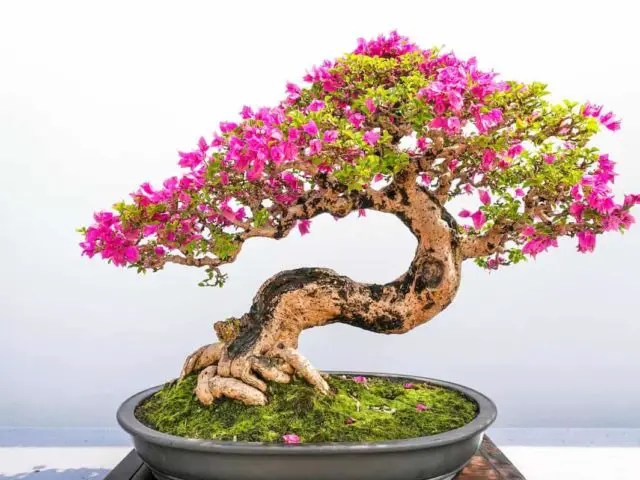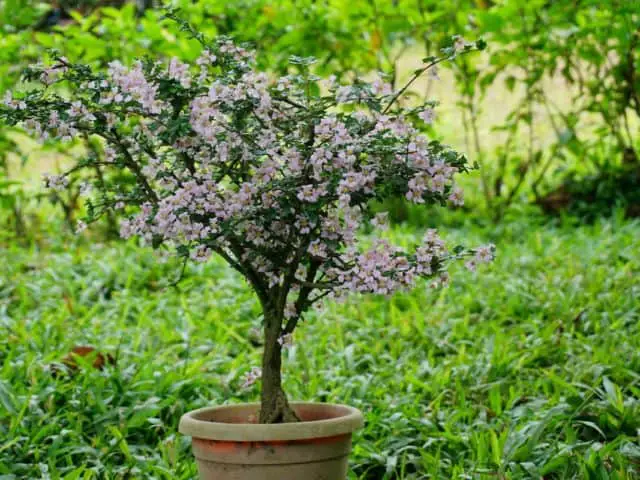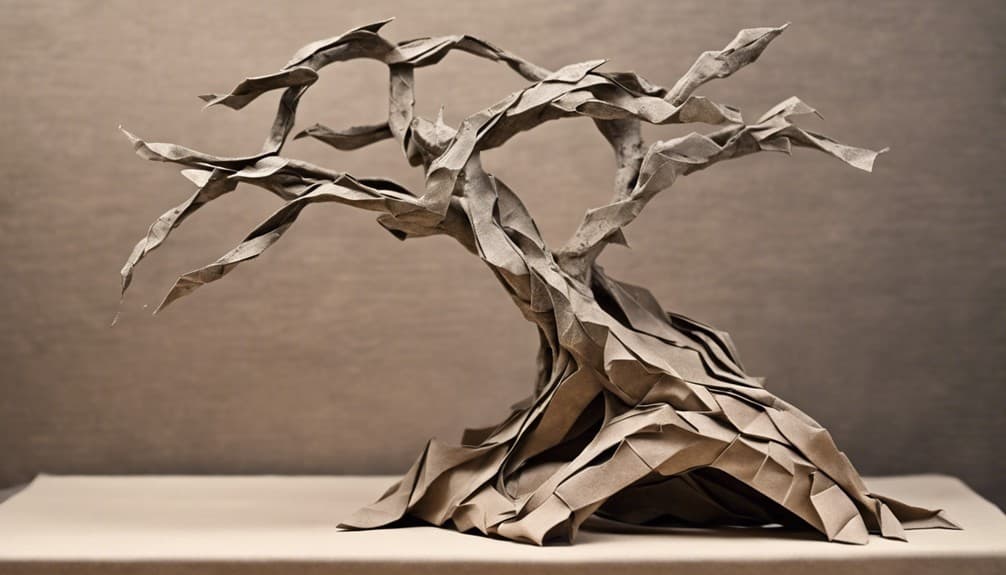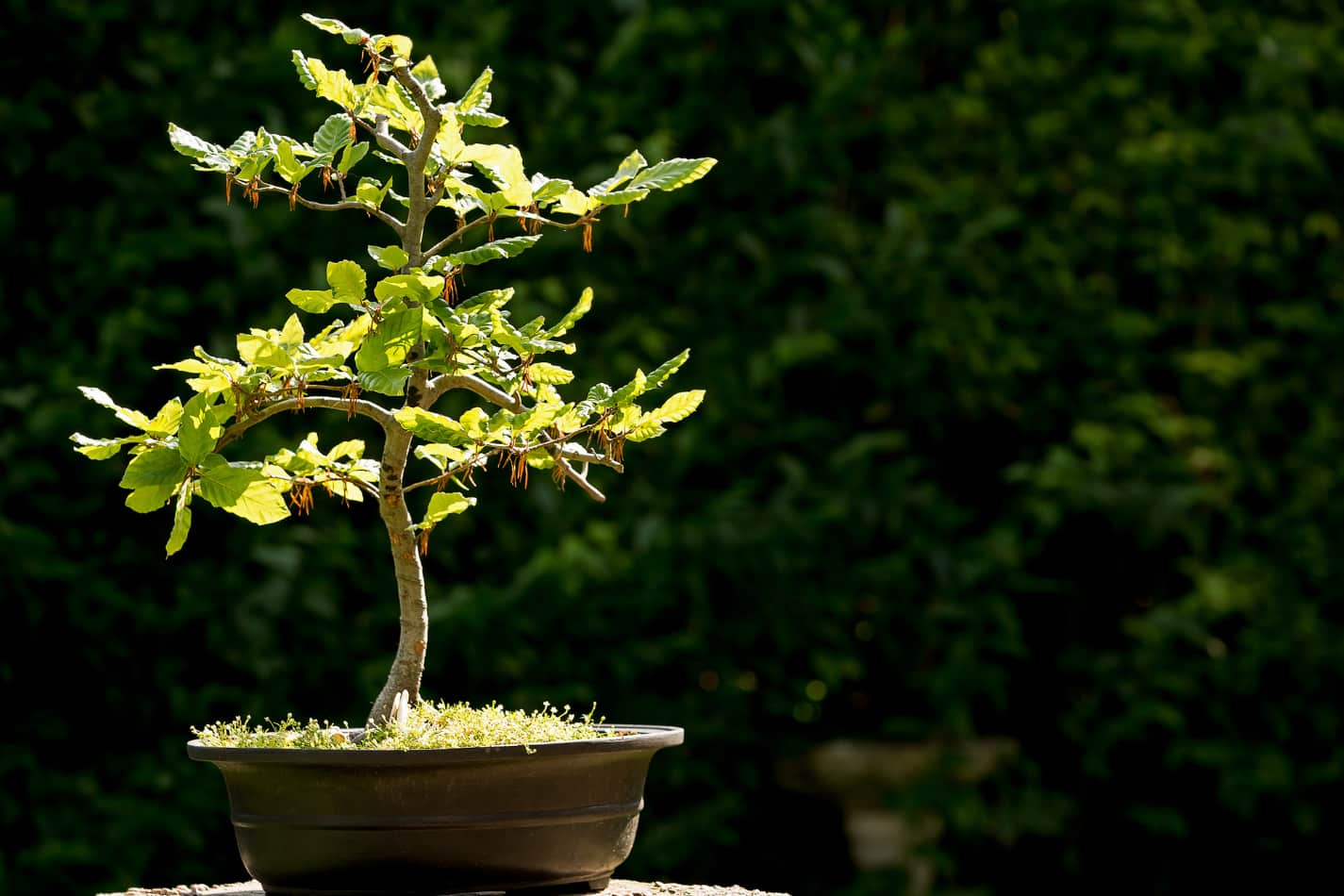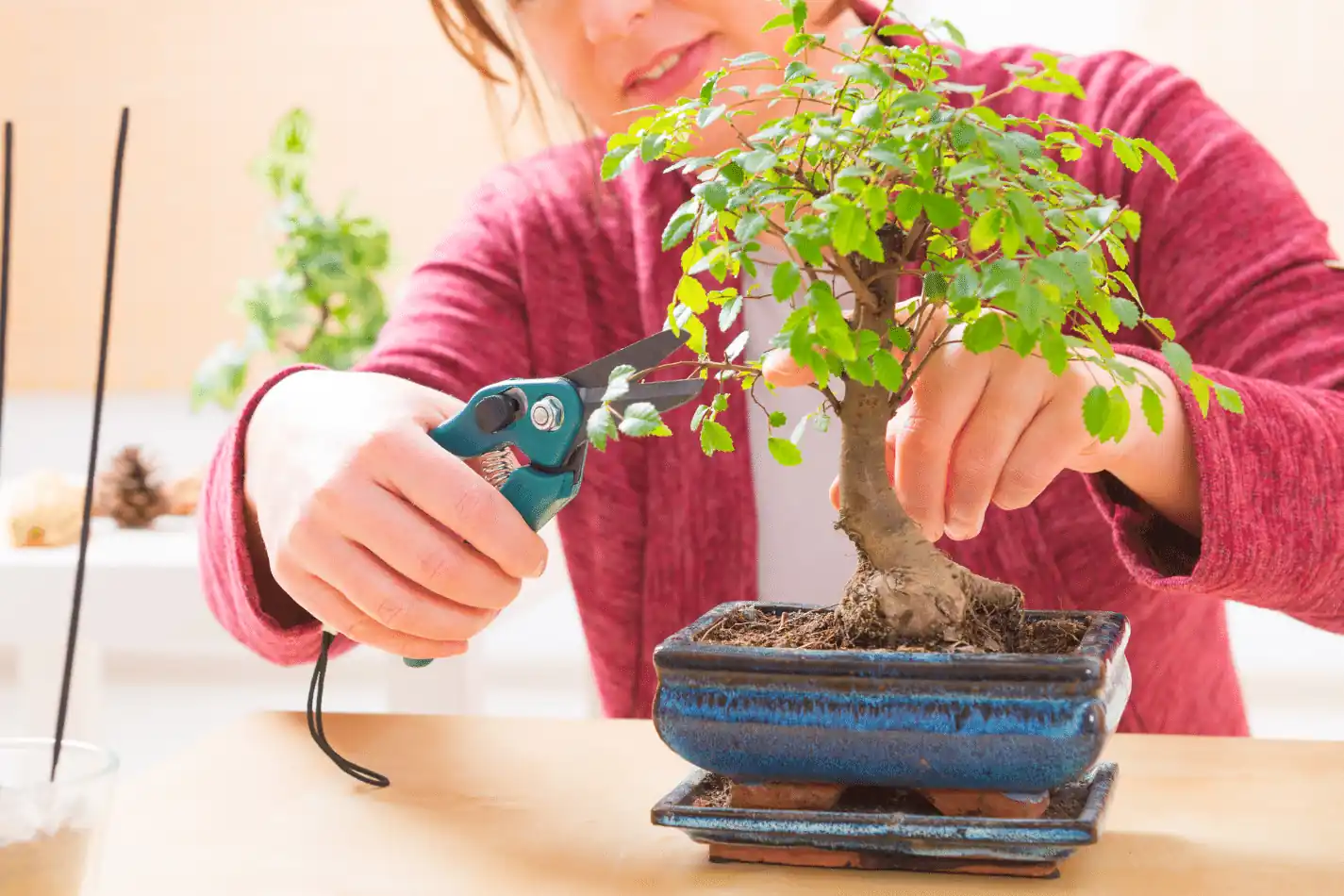Many people shy away from keeping a bonsai tree because they fear that some of these trees might be poisonous to their pets. As a pet owner, you need to do thorough research before introducing bringing a bonsai tree into your home. In this guide you’ll learn what bonsai trees are safe for pets; and how to protect your pets from poisoning themselves.
A lot of bonsai trees are poisonous, and some of them are more poisonous than others. They can range from mild allergies to severe toxicity. The key to keeping your pets safe is researching which trees are harmful to them and avoiding bringing them home.
It’s not easy to list every single poisonous tree because most trees develop some form of defense mechanism against predators, in the form of poison or thorns.
There are a lot of things you need to do before your pets can live in harmony with your bonsai. So, keep on reading as I explain how to make bonsai safe for pets.
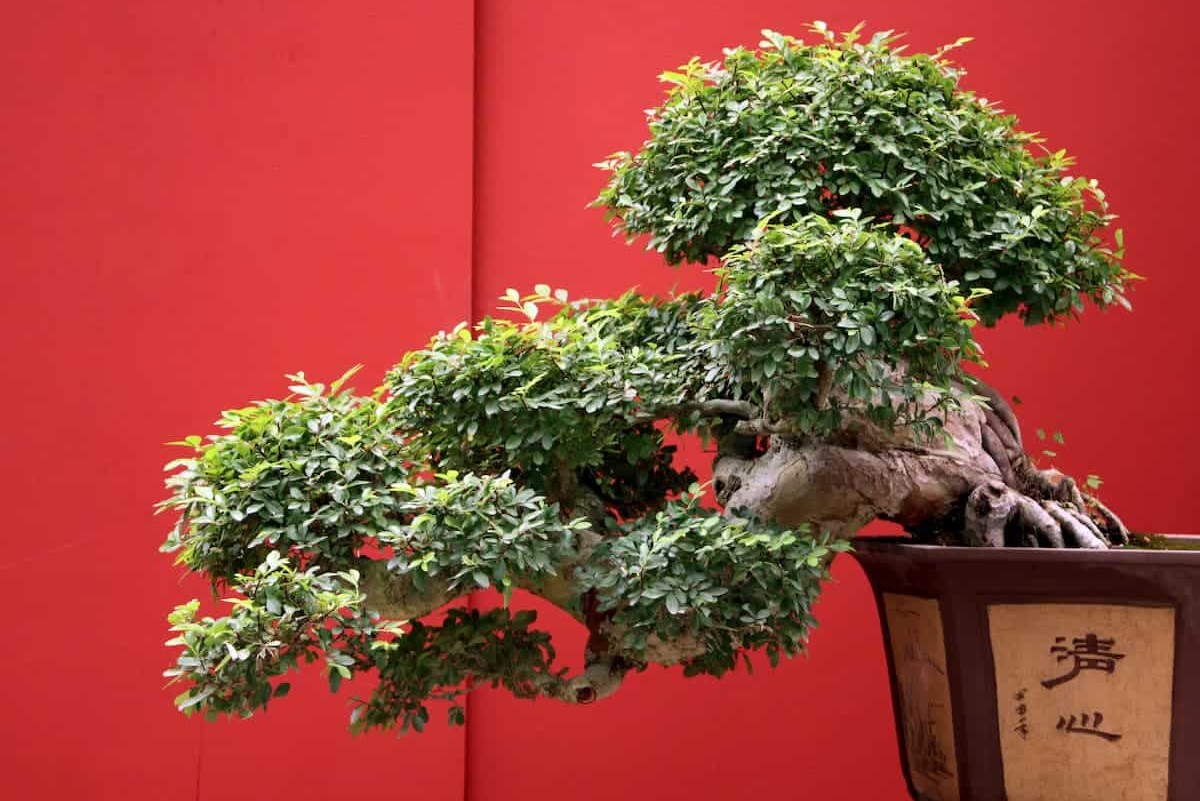
Are Bonsai Trees Poisonous?
Before we talk about what bonsai trees are poisonous, let me clarify one thing first. Bonsai trees are just like any other tree out there. There are no separate species for bonsai.
You can turn every tree into bonsai if you are skilled enough to handle them. A lot of trees are inherently poisonous; it doesn’t matter if you turn it into a bonsai or not.
Some trees are easy to turn into a bonsai, and some trees are prettier than others. Based on these two properties, people usually stick to a select number of species for bonsai. A lot of which is perfectly harmless for humans and animals alike.
Many of the bonsai trees are so harmless that you can even consume their fruits like any other tree, only if they are edible of course.
Now that you know this, you might find it puzzling why a lot of people associate poison and toxicity with bonsai. Leave it to me to clarify where this concern about them being poisonous for pets came from.
Bonsai trees are the same sort of trees you see growing in nature. And a lot of trees in the wild are poisonous, often fatally. It’s the same with bonsai.
When picking trees for making bonsai, what people care about most is how resilient the tree is, how much maintenance it needs, and how pretty it looks. Completely disregarding the fact that it might be poisonous.
This is why a lot of bonsai trees are mildly or even fatally poisonous. Most of these trees are relatively harmless for a grown human but can be deadly to infants and children.
They also pose a huge risk for pets. That’s not all, even plants that are not particularly poisonous have thorns and other structures that can harm children and pets quite severely.
Another thing associated with bonsai and poison is the fertilizer you would need to use. Most of the natural compost is relatively safe for humans but can be problematic for certain pets.
If you need to apply pesticide on your tree, make sure your pet does not ingest any of it. That can be quite harmful.
How to Keep Pets Safe Around Bonsai?
There are a lot of trees that people use for bonsai. A lot of them have toxic properties. They do not affect adult humans because most of them need to be ingested directly.
An adult person would not do that, but pets and children might gnaw on them out of curiosity or boredom.
Thankfully, there are steps you can take to ensure your pets do not end up being poisoned.
Research Bonsai Prior
The best thing you can do to keep your pets safe from bonsai poisoning is to do a lot of research. Every time you think about getting a new species of a bonsai tree, think about your pets. If you have a cat, find out if the tree you plan to buy is not toxic to felines.
Do the same with all your pets. If a tree is on the toxicity list for your pet, avoid it at all costs. No amount of beauty is worth it if it has a chance to harm your pet.
Toxicity aside, some bonsai trees have a lot of needles and thorns. If you have a playful pet, try to avoid getting this sort of tree lest they end up hurting themselves.
Keep the Bonsai Plants Outdoors
If you have a bonsai tree that isn’t fatally toxic for your pet but can cause mild irritations, you could make a compromise and keep it outdoors. Try putting it in your shaded garden or outdoor pots.
If your pets spend most of their time indoors then they are less likely to stumble upon those trees if you keep them outside.
- Place them out of reach: You can alternatively put some trees high up on shelves where your pet won’t usually go. It’s probably not a good idea if your pet is a cat, and cats climb everywhere. But if your pet is a mild-mannered dog, you can easily protect it by keeping the bonsai out of its reach.
- Supervise: If your neighbors have bonsai trees that are poisonous to your dog, then do not let it go there unsupervised.
Which Bonsai Trees Are Safe for Dogs?
Dogs are one of the most common pets because they are very easy to train. As a dog owner, you probably know how much dogs love nibbling on all sorts of things.
It doesn’t matter if they are hungry or not. That, unfortunately, includes houseplants. As you can imagine, it would be terrible if your dog ended up ingesting a bonsai leaf that is poisonous.
That’s why you should always dig as much as you can about a specific plant before you turn it into bonsai. You need to make sure that it doesn’t have any sort of properties that may be harmful to your dog.
Your dogs will nibble on anything; there’s little you can do about that, so do your best to ensure that it doesn’t end up chewing on something that might prove fatal.
Some trees that are considered safe for dogs are:
- Dogwood Tree: Dogwood tree is relatively safe for dogs, and its name has nothing to do with that fact. The worst kind of poisonous reaction it can induce is mild irritation. But if you keep it out of reach from your dog, the chances of your dog ingesting it is abysmally low.
- Japanese Maple: Japanese maples are another safe plant for bonsai as they are not even mildly poisonous to dogs. But as with dogwood trees, they might also produce mild irritation if ingested.
- Purple-Leaf Palm: Purple leaf palms are also called double-pink plum. Now you might be thinking that like any other palm’s they would be poisonous from head to toe, and you would be right.
But the good thing about purple palm is that the amount of toxin it has is so mild that your dog would need to eat a substantial amount of it to be even slightly affected.
Which Bonsai Trees Are Unsafe for Dogs?
As it turns out, most of the bonsai trees are relatively harmless for dogs. So, I’ll only talk about the most poisonous ones. Just avoid keeping these, and you should be fine. Let me list some common plants used in bonsai that are harmful to dogs in particular.
Juniper Bonsai
Junipers are perhaps one of the most common plants you’d ever see for bonsai. It’s a type of conifer, and there are many species of it all over the world. Most juniper trees produce berries, and you probably know them already if you are fond of Gin.
People use juniper berries to make high-quality alcohol. But most of the berries contain a certain amount of toxicity when taken raw. Bonsai junipers also produce berries just like the wild plants.
Juniper berries are not that much of a problem for humans, but they can cause certain complications for dogs. It’s not just the berries; the leaves and needles all contain toxins that can make your dog sick.
Notable species of junipers that are poisonous to dogs are Chinese Juniper, Japanese Juniper, and Blue Star juniper.
This poison is not lethal, so it will not kill your dog. You can identify whether your dog has been poisoned by the symptoms I list below.
The common symptoms are:
- Vomiting
- Upset stomach or digestive issues
- Diarrhea
Additionally, if you have a poorly maintained juniper tree then it could contract mistletoe, most mistletoes have leaves that you can easily identify, but the mistletoes that infect junipers have nearly matching leaves. So, it’s harder to tell if your juniper is infected or not.
If your dog ends up ingesting juniper mistletoe, it can be a lot more serious. You can tell if it was poisoned from mistletoe by the following symptoms:
- Stomach ache.
- Troubled breathing.
- Chaotic behavior.
- Fluctuating blood pressure.
- Fluctuating heart rate.
- Excessive vomiting.
If your dog has these symptoms, contact your vet immediately. Depending on how bad the situation is your vet may either make your dog vomit forcibly, thereby making it vomit the toxins out. Or the vet could perform gastric irrigation.
Additionally, your vet could ask you to keep your dog under observation for a certain amount of time. That would make sure that there are no complications or lingering effects of the poison.
As I said before, Juniper poison is not at all fatal. So you can easily keep both your dog and the plant at your home. All you have to do is either fence it out so that your dog can not get to it.
A good idea is to keep the plant outside. Juniper bonsai is very resilient and can thrive in outdoor conditions.
Azalea Bonsai
Azaleas are beautiful flowery plants. There are thousands of species of azaleas out there. These are both seen as garden plants and as bonsai. Sadly, these beauties are also quite poisonous. They are poisonous for both children and every kind of pet, including dogs.
What’s even worse is that your dog only needs to ingest a very small amount of its toxins to fall seriously ill. The symptoms of Azalea poisoning is visible within a couple of hours after ingestion.
Most humans and animals will fully recover from Azalea poisoning on the condition that they receive immediate medical care.
Azalea poison is not mild like Juniper. It could easily kill your dog if you do not notice the symptoms fast enough. Here is the list of symptoms that you need to watch out for:
- Excessive drooling or foaming in the mouth.
- Vomiting and stomach cramps.
- Seizures and erratic heart rate.
- Lethargic behavior.
- Breathing problems.
- Blood pressure drop.
If you notice any of these symptoms, immediately take your dog to the vet.
Overall, Azaleas are highly poisonous but pets are relatively safe. Most dogs will not go munching on your potted Azalea flowers. Livestock is more inclined to do that, but that only applies to regular azalea and not the bonsai variant.
Still, you must keep your dogs away from these plants as they are curious animals and a single nibble is enough to warrant a trip to the vet.
I would suggest that you avoid keeping Azalea bonsai at all if you have a dog and you spend a large part of the day at work. I would rather not have anything near my dog that could potentially kill it.
So even though you could technically keep both a dog and Azalea bonsai with enough care, I’d advise against it.
Japanese Sago Palm Bonsai
Sago Palms are perhaps the most dangerous bonsai plant that you can have. From the roots to the crown, all of it contains poison. And it could easily kill your dog if you are careless. Avoid it at all costs.
Aside from these, Boxwoods, apricots, Ivy palm, are also relatively toxic plants and must be kept outside the reach of your dogs.
You should keep all bonsai trees outside the reach of your dogs, it doesn’t matter if it’s poisonous or not. As your dogs can just as easily harm some expensive bonsai trees.
Which Bonsai Trees Are Safe for Reptiles?
Dogs and cats would nibble on plants for sport, but reptiles might try to eat them thinking it’s food. That is the only problem you can face. Ideally, you would want to keep your bonsai away from any reptilian pets.
Many people find putting a bonsai in the lizard or snake cage looks amazing, and they are right to think that. But you need to consider a few things before you do put them in. If you’re keeping a large gecko, you need to put a tree that won’t break if it tries to climb it.
Similarly, avoid putting in any trees with too many thorns on them, as your lizard friends might end up injuring themselves.
Some non-toxic bonsai trees that you can have with your reptile pets are as follows:
- Peperomia Green
- Bamboo Palm.
- Parlor Palms.
- Prayer Plant.
- Spruce.
You need to keep in mind that you should only put these in the cage of reptiles that are not herbivores. Otherwise, they would eat your expensive bonsai.
The plants I mentioned are a big no-no if you’re thinking of putting them in a vivarium with a snake. If your snake weighs more than a pound, it will squash most of them flat.
If you’re thinking of putting bonsai in a vivarium, you do not need to think about toxicity. Most of the snakes do not try to nibble on tree leaves and are therefore immune to most of its poison.
First of all, you need to take note of the length and weight of your snake. Depending on how large the snake is, you would need to select a strong enough bonsai tree.
The toxicity level of the bonsai tree does not matter for a snake. You only need to make sure that it has a strong root system. Older trees are much better than younger trees in this regard.
That said, bonsai plants are inherently weak. So, try not to put them with large snakes as they are very likely to break or topple them. For a medium-sized snake, you could try something with the dracaena plant. Be warned, these bonsai tend to grow very fast and need constant trimming.
The case with Reptiles is that a lot of trees are extremely poisonous for them, such as azalea, most variants of figs, sage, Maple, etc. But none of them compare to the harm inorganic fertilizers and pesticides can do.
Always try to use organic fertilizers on your bonsai that are close to where you keep your lizard. If you have to use pesticides, then take the tree out of the reptile’s cage and apply it. Only put it back after all the poison washes away.
Which Bonsai Trees Are Safe for Cats?
Cats are lovely little animals, and there’s hardly anyone who does not love them. Cats are, however, the worst possible pet you can have with a bonsai.
I’m a cat person myself, and I assure you if you have a cat and a bonsai in the same room, it is not the cat you should be worried about. These little devils can climb anywhere, and knock anything over.
On a more serious note, cats have the habit of chewing on houseplants, this includes all your bonsai too. There’s nothing you can do to prevent them from doing it, except maybe make a protective casing for the plant.
Alternately, you could put the plant outside. Cats are less likely to go knock things down when outside.
As I was saying, cats gnaw on leaves when they are bored. And there are indeed a lot of species of bonsai plants that can be severely toxic to your furry friend. First, I’ll list some good non-toxic bonsai plants that you can keep along with your cat.
Japanese Maple Bonsai
Japanese maples and any other similar variants of trees are non-toxic to most pets. They have strong trunks so it is highly unlikely that your cat can break the trunk and damage the tree too much. It does however have a moderate root system, so your cat could end up knocking the whole tree down.
Ideally, you would want to place it high enough so that your cat cannot reach it. And you have to secure it to whatever platform you place it on so that it doesn’t get knocked over. Japanese Maple is also harmless for any other pet you could think of.
Fukien Tea Bonsai
Fukien Tea is one of the more traditional bonsai plants. It originates in Fuiken, china. However, it’s more commonly seen as bonsai in western countries.
One of the reasons why it’s so popular in the west is its inherently low toxicity. It is perfectly safe for most pets.
Fukien tea doesn’t pose any threat to your cat. However, it is an indoor bonsai. Your cat poses a lot of threat to the lifespan of this tree. You should keep it away from your cat at all costs.
Bamboo Palm Bonsai
Bamboo palms are perfect bonsai if you are a cat owner. These plants have no adverse effects on cats, and cats tend to not chew on the leaves too much because they are kind of rough.
Ficus Bonsai
You might be surprised to see Ficus on the list of cat-friendly plants. Because a lot of toxicity chart makers place it in the toxic plant category quite often. However, they only do that because it may cause slight irritations when ingested.
Cats are pretty smart animals, and they tend to avoid nibbling on it a second time. It poses no severe health hazards either, so you can pretty safely have a Ficus bonsai along with your cat.
Money Tree Bonsai
Money trees, a tight slap to the face of people who say money doesn’t grow on trees. Jokes aside, the Money tree is a non-toxic bonsai tree. You can have it with any pets. Your pets are more of a threat to this tree than the other way around.
Tree of a Thousand Stars Bonsai
The tree of a thousand stars is a safe bonsai for your cat. But be warned, it is one of the trickier bonsai plants and it needs a significant amount of care. It is also one of the more expensive plants out there.
So, you should take proper care and keep it out of your cat’s reach, as your little furry friend might end up harming the plant.
Which Bonsai Trees Are Unsafe for Cats?
The list of Trees that are severely harmful to your cat is very long. Most trees that produce a strong concentration of sap can be considered a no-go for cats. Some of the notable trees that you should never have along with a cat are:
Sago Palm Bonsai
Sago palm is one of the most toxic bonsai plants out there. It is harmful to both humans and pets. The entirety of this plant’s body is poisonous to your furry friend. The seeds of this plant have a higher concentration of toxins and are especially harmful to cats.
It is not a mild poison, and if left untreated, your feline friend may die. If your cat ends up ingesting the toxin, the symptoms would start to show up within 20 minutes.
The symptoms are:
- Excessive drooling
- Seizures
- Upset stomach
- Liver problems
- Ataxia
- Runny stool
- Bloated stomach
You must be extremely careful if there are any sago palms near your place. Even with timely treatment, there is only a fifty perfect chance that your cat will make it out alive. Sago Palm is a bonsai that you have to stay as far away as you can. If you value the life of your cat.
White Cedar Bonsai
White cedar is a beautiful looking bonsai. It is very eye-catching and it goes well with a lot of decor styles. Sadly, cats tend to play with it and damage the tree. What’s even worse is that it is extremely toxin for felines. If your cat has a chewing habit, avoid this bonsai tree at all costs.
Rubber Plant Bonsai
All kinds of rubber plants are toxic to pets. They have condensed sap that harms any pet. Cats tend to scratch and draw out more sap. It’s sticky so most cats will try to lick themselves clean and get sick in the process.
Jade Bonsai
Jade is also a kind of rubber plant. It is a very resilient bonsai plant, that’s why it’s also one of the most common picks for newcomers. I’m mentioning this plant specifically. When someone first takes up bonsai, they often tend to be ignorant about the toxicity of plants.
This ignorance can be very harmful to their pets. Jade plant or Crassula Argentea is a perfect element for disaster if you own a cat.
Thankfully it is not fatal like Sago Palm. It can cause your cat to vomit and lower its heart rate. Take your cat to the vets if it starts acting weird. The most problematic part about this plant is not the plant itself, but the fact that cats like nibbling on it.
Azaleas Bonsai
Azalea is beautiful, it is perhaps of one the best flowery bonsai trees out there. But most species of Azalea contain a high concentration of glycoside. This substance is harmful to both cats and dogs alike.
It starts working faster in the case of cats because of their smaller stature. Primary symptoms of poisoning include vomiting, runny stool, and lethargy.
Azalea poison also keeps slowing the heart rate down considerably. This could eventually lead to cardiac arrest you do not notice in time.
I would consider most variants of Azalea to be fatal for cats. I advise that you avoid keeping this plant and your cat in the same house.
Fig Bonsai
Although figs are primarily fruit plants, you can easily turn most of its species into bonsai. It is quite the popular plant for bonsai as many people love the miniature shape of a fig. Even as a bonsai, the fruits are perfectly safe for eating.
The rest of the tree, the leaves, and the sap are highly toxic for pets. Its toxicity level is not substantially high. But if you leave your pet untreated for too long, it could do a lot of damage. If you see your cat drooling excessively and vomiting, chances are it ingested some part of a bonsai fig.
Since cats have a lot of plants to be wary of, I suggest you check very thoroughly before purchasing any bonsai trees. Also, you should consider getting an outdoor bonsai. Because most cats will very likely ruin any delicate bonsai if you keep them indoors.
Final Thoughts on Are Bonsai Safe for Pets
When you want to look and add a bonsai to your house you really need to look at more then just how they look, you need to know how they will interact in your home.
Pets are always known to bite and get into things they aren’t supposed to which could lead to issues with your pets health which would be a major bummer, be knowledgeable!
If you are just learning about bonsai trees and looking to purchase high quality trees that will likely live longer than you then I would highly suggest checking out Bonsai Boy Trees as they are a long lasting New York business that provides trees for all price ranges!


